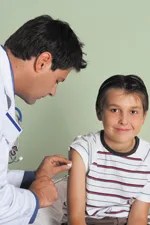Your child is due to be vaccinated, but you’ve heard that talk about potential dangers and you’re not sure what to do. Get the immunization! Read on to learn more about the whats, whens, and whys.
The development of immunizations to prevent infectious diseases is one of the most important advancements in medicine to improve the health of children. Parents may not understand the importance of immunizations because many vaccines are so effective that they are unfamiliar with the infections these vaccines are designed to prevent. In fact most physicians have never seen the vaccine-preventable infections polio and diphtheria, and many have not seen cases of measles or meningitis caused by Hib (Haemophilus influenzae type b).
 Nevertheless, on time vaccination is important. In recent years there have been several resurgences of diseases due to the failure of parents to ensure timely vaccination of their children. During 2008, the state of Minnesota had five cases of Hib disease, the largest number during the past 15 years. Three of these children had received no doses of Hib vaccine because of parental refusal to vaccinate, including a 7-month-old who died of Hib meningitis. In the United States, there were more cases of measles in 2008 than in any other year this decade. The increase was due primarily to cases in children and adolescents who had not received the MMR vaccine.
Nevertheless, on time vaccination is important. In recent years there have been several resurgences of diseases due to the failure of parents to ensure timely vaccination of their children. During 2008, the state of Minnesota had five cases of Hib disease, the largest number during the past 15 years. Three of these children had received no doses of Hib vaccine because of parental refusal to vaccinate, including a 7-month-old who died of Hib meningitis. In the United States, there were more cases of measles in 2008 than in any other year this decade. The increase was due primarily to cases in children and adolescents who had not received the MMR vaccine.
What Vaccines for What Diseases
The vaccines that are routinely administered to infants, children, and adolescents are given to prevent the following diseases:
• Hepatitis (yellow jaundice and infection and inflammation of the liver): hepatitis A and hepatitis B vaccines
• Liver cancer caused by hepatitis B infection: hepatitis B vaccine
• Meningitis (inflammation of the membrane on the brain that may cause death, deafness, or brain damage): Hib vaccine, pneumococcal vaccine-PCV7, meningococcal vaccine
• Pneumonia: Hib vaccine, pneumococcal vaccine-PCV7, influenza vaccine
• Ear infections and need for ear tubes: pneumococcal vaccine-PCV7, influenza vaccine
• Whooping cough: DTaP vaccine, Tdap vaccine
• Tetanus (lockjaw): DTaP vaccine, Tdap vaccine
• Diphtheria (throat infection with blockage of the windpipe): DTaP vaccine, Tdap vaccine
• Polio (cause of paralysis and death): IPV
• Encephalitis (brain inflammation) due to measles: MMR vaccine
• Measles: MMR vaccine
• Mumps: MMR vaccine
• German measles/rubella (causes damaged newborns due to infection during pregnancy): MMR vaccine
• Chicken pox: varicella vaccine
• Cervical cancer due to HPV: HPV vaccine
• Flu and flu-related deaths: flu vaccine
• Severe diarrhea due to rotavirus resulting in hospitalization: rotavirus vaccine
When to Get What
The schedule of vaccines for children can be divided into five time periods: at birth, at 2-6 months of age, at 12-18 months, at 4-5 years, and at 11-12 years. Several vaccines require multiple doses to achieve optimal protection and boosters to maintain protection. Some combine several vaccines into a single shot, reducing the number of injections that an infant needs.
Newborn: 1 dose of hepatitis B vaccine
Age 2-6 months: 3 doses of DTaP, 2-3 doses of Hib, 3 doses of PCV7, 2-3 doses of oral rotavirus vaccine, 2 doses of hepatitis B vaccine, 2 doses of polio vaccine
Age 12-18 months: 1 doses of DTaP, 1 dose of MMR, 1 dose of varicella (chicken pox), 2 doses of hepatitis A, 1 dose of polio vaccine, 1 dose of Hib, 1 dose of PCV7
Age 4-5 years: 1 dose each of MMR, varicella, DTaP, and polio vaccines
Age 11-12 years: 1 dose of meningococcal vaccine, 1 dose of Tdap, and for girls, 3 doses of HPV
In addition, flu vaccine is recommended annually for all children between 6 months and 18 years. Two doses are needed when those younger than 9 years of age are receiving the vaccine for the first time. For healthy children at least 2 years old, flu vaccine can be given as a nasal spray instead of by injection.
Safety Concerns
Discuss concerns about the safety of vaccines with your child’s pediatrician or other healthcare provider. Clinicians routinely provide parents with a Vaccine Information Sheet, known as VIS, for every vaccine administered, explaining the purpose of the vaccine, potential adverse effects, and its safety profile. You might feel reassured that in February, after hearing scientific evidence presented by those representing both sides of the issue, the Special Masters of the U.S. Court of Federal Claims ruled that MMR vaccines and thimerosal-containing vaccines alone or in combination do not cause autism. None of the vaccines listed above contain the preservative thimerosal (a form of mercury) except certain formulations of flu vaccine.
The Newest Strain
This spring, a new strain of flu called the H1N1 virus struck in Mexico and later sickened students in a high school in Queens and around the world. This new strain is different from the flu strains that cause the annual winter epidemics in the U.S. each year. It has elements of a regular human flu (known in the medical community as an “A” strain), but also has elements of flu strains that infect pigs (swine flu) and birds (avian flu).
Commonly called “swine flu,” its more accurate names are “novel influenza A:H1N1” or “pandemic flu strain.” With the exception of some people 60 years and older, most people do not have immunity to this new strain.
Symptoms are similar to regular seasonal influenza. Typically there is an abrupt onset of fever with headache, sore throat, runny nose, chills and muscle aches. About half of patients experience nausea, stomachache, diarrhea, shortness of breath, and joint pain. Most cases are of moderate severity with recovery in three to seven days, without a need for hospitalization.
As with the seasonal flu strains, occasionally a child gets a severe case that needs hospitalization, and in rare situations, there is a fatal outcome. Like the seasonal flu, this virus is easily transmitted through coughing and sneezing. The regular flu vaccine does not protect against the pandemic flu strain. A vaccine against this strain is being developed and might be available as soon as the fall of 2009.
LORRY G. RUBIN, M.D., is chief of Pediatric Infectious Diseases at Schneider Children’s Hospital of the North Shore-Long Island Jewish Health System, and professor of pediatrics at Albert Einstein College of Medicine.






















